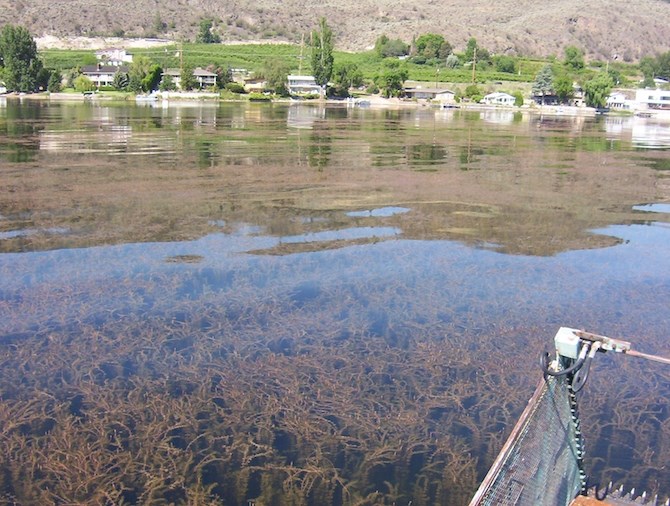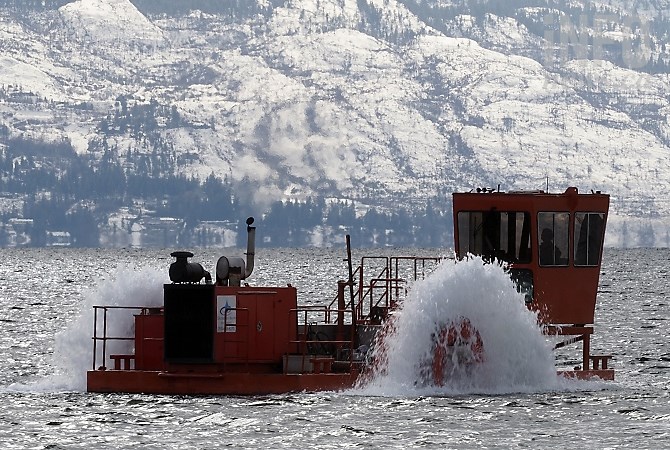
If milfoil is left unchecked, this is what lakes will look like. This shot was taken near the north end of Osoyoos Lake in 2010
Image Credit: Submitted by Okanagan Basin Water Board
April 09, 2019 - 6:30 PM
KELOWNA - The cool inviting waters off Vernon’s Kin Beach are turning into a “big mucky mess” that is heading towards poisonous algae blooms and dying fish as a battle rages between provincial and regional boards.
The province is banning rototilling of the invasive Eurasian Milfoil in areas where even a single endangered Rocky Mountain Ridged Mussel has been found.
Restrictions started in small areas around Summerland and Okanagan Falls some years ago but changes in provincial regulations have escalated protection efforts and that could have severe consequences for beachgoers throughout the Okanagan.
“What happens in the long run, in areas where we’re not allowed to rototill, is that the plant continues to grow year after year,” James Littley, the Okanagan Basin Water Board’s Operations and Grants Manager explained to iNFOnews.ca.
“As it dies and starts to decompose, it creates a kind of sludge on the bottom of the lake,” he said. “It will turn the lake bottom from sand to a big mucky mess. That has led, in some areas with really thick milfoil beds, to fish dying of suffocation because of a lack of oxygen. It creates almost standing water and promotes blue green algae, which are toxic algae blooms.”
The mussel, while endangered, has a range from Southern California and into the Okanagan.
It was spotted in the northwest corner of Kin Beach five years ago so no rototilling has been allowed since then. It was banned this winter off the rest of the beach.
Rototilling has been done there since the 1980s.
“The water has gone from what one of my operators described as ‘like walking in sewage’ back then to this nice sandy bottom,” Littley said.
But, that has changed in the northwest corner where he expects significant milfoil to be seen by July.
There are areas around Casa Loma in West Kelowna, other parts of Vernon Arm, Skaha Lake and the northern part of Osoyoos Lake where rototilling was also banned this winter.
“The Kelowna foreshore hasn’t been affected yet because they haven’t found mussels,” Littley said. “But I don’t know if they’ve actually done surveys there or not. The long-term risk is, the more places they find mussels, the more areas will be restricted from future rototilling.”
New provincial guidelines mean that, if one mussel is spotted, no rototilling can be done for 100 metres. So, Littley said, if five mussels are spotted 100 metres apart on a beach, rototilling will be banned along 500 metres of beach.
The problem is that there’s not a lot known about the mussels or its preferred habitat.
For one thing, the mussels like river water better than lakes so there are thousands of them in the Okanagan River channel.
Secondly, from what Littley can see, mussels like more gravelly bottoms while milfoil prefers sand so, he believes, the mussels are generally outside the area that is rototilled.
And, thirdly, if left unchecked, milfoil creates the “mucky mess” that would kill any mussels.
“My opinion is that we need more science to know what is fact,” he said. “The new prohibition regimen is not based on a lot of science, it’s speculation that mussels exist in milfoil beds and limited studies to say we’re having a negative effect on them.”
Rototilling is done in the winter and does a good job of virtually eliminating the milfoil by ripping up the roots. If rototilling is stopped, it can take a few years for heavy growths of milfoil to bother swimmers.
The alternative is to harvest in the summer. But that only goes a few feet into the water, can create a safety hazard for swimmers and requires stinky piles of the weed to be stacked on the shore awaiting transport.
The Okanagan Basin Water Board had a five-year permit to rototill with some restrictions (such as Summerland).
An application was made in August for renewal, but it has only been given a temporary permit with more restrictions and a suggestion that it ask the federal government to review the Fisheries Act.
The battle over the future of Okanagan beaches may come down to Kin Beach.
“This winter you could already start to see where weeds had deteriorated and washed up in muddy piles on the beach,” Littley said, referring to the northwest corner. “We’re going to be going into that area and looking at kind of a line in the sand of the half we haven’t been able to go into for five years and the half we only got excluded from this year. We’ll take some drone photos and show what the actual difference is in the milfoil growth in those areas.”

A milfoil tiller works near Strathcona Park in Kelowna Feb. 28, 2017.
(ADAM PROSKIW / iNFOnews.ca)
To contact a reporter for this story, email Rob Munro or call 250-808-0143 or email the editor. You can also submit photos, videos or news tips to the newsroom and be entered to win a monthly prize draw.
We welcome your comments and opinions on our stories but play nice. We won't censor or delete comments unless they contain off-topic statements or links, unnecessary vulgarity, false facts, spam or obviously fake profiles. If you have any concerns about what you see in comments, email the editor in the link above.
News from © iNFOnews, 2019